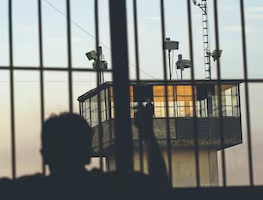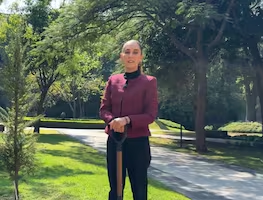Más Información

Noroña estalla contra sus "haters" en mensaje de fin de año; "lo único que saben destilar es odio, están jodidos"

Sheinbaum publica en el DOF reforma en materia de prisión preventiva oficiosa; entra en vigor el 1 de enero de 2025

Sheinbaum cierra el 2024 con mensaje de Año Nuevo; recuerda legado de AMLO y reafirma continuidad de la 4T
On the night of January 28, the name of Ann Donnelly flooded social media as she issued a suspension order launched from her Court in Brooklyn. Donelly, with only one year in office in the federal judicial circuit, became the first female judge to block an executive order of the new U.S. president, Donald Trump.
The measure, signed by Trump only a day earlier, was announced as the temporary revocation of authorized admissions into the U.S. for citizens from seven countries: Libya, Syria, Iraq, Iran, Sudan, Yemen and Somalia, which aimed to protect national security against terrorism.Though the order’s criteria focuses on the nationality of individuals, it has been known as Muslim ban, a term coined by Trump himself during his run for presidency, as banned citizens from the seven countries come from Muslim-majority nations. Not an hour had passed from the issuing of the first suspension to the ban when it was made known that a federal court in Alexandria, Virginia, under judge Leonie Brinkema, issued a similar suspension.
Without a doubt, this has been the most controversial executive order signed by Trump, which stirred a strong citizen reaction who jammed the main airports of the country to support those who had been arrested on their arrival to the U.S., among them permanent residents that had temporarily left the country to visit their home countries, Syrian refugees scheduled for arrival that very same weekend and Iranian citizens scheduled for medical procedures.
In the following hours, federal courts from the cities of Seattle, Boston and California’s central district followed the suspension example. By Wednesday February 1st, there were thirteen claims against Trump in relation to the Muslim ban, more than a lawsuit per day for each day of the Trump administration. Additionally to the claims against the Muslim ban, there are thirty more lawsuits against Trump in relation to several issues. Among them, the most advertised has been for violation to the Emoluments Clause of the United States Constitution, which was filed first thing on Trump’s first working day in office.
Plaintiffs from the Citizens for Responsibility and Ethics in Washington (CREW), accuse the U.S. president of violating the Constitution by receiving payment from foreign governments through his investments based in other countries without Congress approval. Trump could have avoided this claim by distancing himself from his investments before January 20th, but he did not. The organization accuses Trump of receiving money and favors of foreign governments through invitations and events held in his hotels, rents from his properties and real-state businesses. China, India, Indonesia and the Philippines are some of the countries with whom Trump holds business ties. The organization considers that the conflict of interest is clear: he cannot seat at the same table with people with whom he makes personal business to negotiate on behalf of the people of the U.S. Before Trump was sworn as the 45th president of the U.S., several organizations have raised the question of a possible impeachment, which, according to the United States Constitution, is applicable “for, and Conviction of, Treason, Bribery, or other high Crimes and Misdemeanors.” as stated in Article II, Section 4.
The demands against a new presidency are not unusual, but this 55 federal claims contrast with those of their predecessors: in their first two weeks of rule, Bill Clinton and Barack Obama faced five, and George W. Bush, four.
An administration amidst disputes
“These first two weeks have been chaotic”. This is how Anil Kalhan, associate professor of Drexel University Thomas R. Kline School of Law in Philadelphia, defines the social environment that permeates in the country, as well as the turmoil lived by civil rights and immigration lawyers: “There has been a flow of executive orders that clearly lack a careful administrative revision on behalf of the government staff or whoever are in charge in the Trump administration”.
“Proof of the matter is that the executive order from January 27 resulted in a weekend of chaos not only for those affected by the ban, but for the government officials who could not rely on a single guideline that could help them interpret the order; there was no direct intervention nor instructions issued by the Homeland Security Secretary, and, once the courts issued a temporary blocking to the ban, many officials failed to know how to respond to this”, said Kalhan.
The lack of rigor in the writing of the executive orders that the U.S. president is signing is one of the reasons for the surge of all these lawsuits. Many of the actions proposed by Trump, such as the budget cuts to self-named “sanctuary cities”, those in which local authorities have refused to arrest immigrants for their illegal immigration status, or the construction of a border wall, are really subject to Congress approval. Other actions plainly violate protection of human rights international standards. In all cases, legal response is surfacing, apart from street protests. Although, most of the claims against Trump come from, so far, from individuals affected by his policies, legal actions on behalf of state prosecutors and other federal authorities have started to emerge.
On Monday January 30th, Maura Healey, Attorney General of Massachusetts, posted in her twitter account: “I don’t wake up everyday looking for a way to sue Donald Trump. But we are 10 days in and I’ve filed three cases already.” Ms. Healey made reference to the three lawsuits filed against the U.S. president within her precinct, all in relation with the Muslim ban.
Additionally her office holds three more legal actions against Trump: one filed jointly with other sixteen state prosecutors to prevent the dismantling of the Consumer Financial Protection Bureau, a second claim in relation to environmental regulations and a third claim, jointly filed with attorneys from Illinois, Maine, Maryland, Nueva York and Washington D.C., that seek the regulation of private universities.
Most of the claims related with the Muslim ban have been filed on behalf of individual citizens, such as the one brought to action by Mohammed Tawfeeq, an Iranian producer from CNN, who has been a permanent resident in the U.S. since 2013 and who was arrested last Sunday in Atlanta. However, one claim was filed directly by Washington Attorney, Robert Ferguson, who argued that the legal action seeks to protect the state “including its residents, employers and educational institutions against the illegal actions of the president and the federal government”, as the executive order “separates Washington families, hurts its residents and damages its economy”.
As for the executive order againsta sanctuary cities, the claim filed by San Francisco City Attorney, Dennis Herrera, could be replicated within the next days in other cities. On Tuesday January 31st, Herrera brought legal action against Trump, arguing that “The president’s executive order is not only unconstitutional, it’s un-American...That is why we must stand up and oppose it. We are a nation of immigrants and a land of laws”. According to Herrera, Trump exceeded his capacity by signing this order.
Additionally, more claims are expected to be filed in the following days by companies affected by the immigration adjustments recently enforced, such as Silicon Valley’s Google, Airbnb and Netflix, among others, who currently employ workers holding a working visa from the seven “banned” countries. Changes in the visa regime, one of the issues Trump is likely to address in the next few days, can also suffer from the same legal consequences.
How far can all this go?
A few hours after the Muslim ban was announced, groups of volunteer lawyers began work in the coffeehouses of airports and the American Civil Liberties Union (ACLU), the largest civil rights organization in the U.S. filed its first claim on behalf of a pair of siblings from Iraq in judge Donelly’s federal court; this is how the first suspension to the ban came to be. The legal battle was underway at the same time civil resistance protests took place that weekend.
Seventy-two hours after the executive order was signed, and blocked, the ACLU reported reception of donations for US$24m via its website, six times what it usually collects in a year, in just three days.
Kalhan, who also chairs New York City Bar Association's International Human Rights Committee, this is a sign, that despite term’s of these processes can be exhausting, namely local court resolutions, transfer to an appealing court and ultimately to the Supreme court, most of this disputes will be taken to their final conclusions because people are willing to support them: “Immigration disputes have a greater significance than mere resistance, as these can trascend… there are at least twelve being brought to action in the country and I think there are more to come, as there are universities with students being affected and employers in similar circumstances. Sanctuary cities have also started to file their own claims”.
“I believe there will be plenty of lawsuits in court, sanctuary cities will probably make it to the Supreme Court, but there is more to come: disputes over expedite deportations, disputes filed by those affected by the construction of the border wall”, says Kalhan.
He adds: “This is by far, the U.S. president with the largest number of claims in court that I can remember. This administration will be very busy defending in court each of the actions it decides to implement, in the next four years”.







